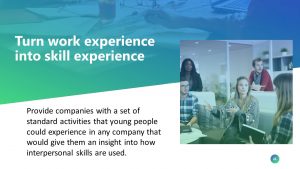

Blog Posted : 17th December 2019
by Frank Nigriello, Chairman of Oxfordshire Business First
Amy P. is 14 years old and is choosing her GCSEs.
She will be a productive member of society in between 5 – 7 years.
Compare yourself to Amy and consider the changes that you have seen the past decade.
For instance, you were lucky to have 3G. (4G 2012)
You couldn’t order an Uber on your phone (2012)
You couldn’t rent a room on AirBNB (2012)
You couldn’t get an Ipad (2010)
There was no Instagram (2010) or Kickstarter (2009)
3D Printing, Smart Cities, AI, Neural Networks and Quantum computing were just ideas.
So what can Amy P. expect when she starts work in 2025?
We can’t predict that world but we do know that there are some basic interpersonal skills that will surely be required to adapt to the pace of change that young people will be facing. Amy P. needs to practise these skills to refine them.
Amy will also need some digital skills. She will need to be able to write code; although code may be more like an app that is menu driven.
She will certainly need to understand data, it will be increasing exponentially in volume and in terms of importance.
GCHQ, for instance, calculates that the amount of data created between the advent of humankind and 2002 is now created daily.

90% of all the data that has ever been created was created in the last 18 months. This is every email, every text, every WhatsApp, every Facebook like, every Tinder swipe, every ASN, every stock move, every despatch note.
2.5 billion gigabytes of data are created every day.
She will need to understand sensors. Sensors are the essential underpinnings of most data collection and have a huge number of uses.
She will need to have some skills in most of these areas and acquire deep skills in some.
So who will teach Amy P. about these skills for industry in the next 5 – 7 years?
The Gatsby Benchmarks offer a standard for schools’ careers and enterprise provision. The overwhelming majority of schools (79.4%) achieve at least one benchmark and most (51.0%) achieve at least two.
But the benchmarks don’t have any reference to learning outcomes for what learners are expected to achieve.
They measure input.
There is a commonly held misconception that a week spent in work experience in a company will provide a significant level of insight into a potential career path.
It would be more successful for those precious work experience weeks to be structured around skill building and business awareness.
Another misconception is that schools can provide effective levels of information about industry. Most teachers, however, have spent no time working in business. How can we expect them to have the depth of knowledge and understanding to advise young people?
So what can business people do about some of these problems?
There are a few simple, but not easy, changes that could be made.

The first is turning work experience into a skill experience. This would involve the development of a set of standard activities that young people could experience in any company that would give them an insight into how interpersonal skills are used.
Think about it like a treasure hunt. Young people would be given some material to review about the core interpersonal skills and would be asked to log what they observed every day.
Companies would structure the work experience week so that certain interpersonal skills like team communication or active listening would be accessible and could be demonstrated. As part of the experience, the students could spend some time in activities that enabled them to learn more about the company and the sectors it operates in.
The point is that work experience would be a value-adding set of prescribed activities which would make it easier for companies to offer work experience weeks and make it more valuable to young people.
The second change is some training for teachers in the businesses that exist in the area – taking that place-based approach – and to look at the trends that will be shaping industry. Teachers have CPD or inset days that are held every year. It would be beneficial for local companies to work with them to inform them about today’s business challenges.
Few industry leaders are experienced in managing through revolution, but the pace of change in most sectors is forcing us to learn quickly.
Many companies have gone to great lengths to prepare their existing employees, but it is the student population – our future employees – who need to be prepared for the challenges that this digital revolution poses.
The message from industry is clear: it’s not enough to prepare young people for the future – we need to prepare them to become the future.
Back to Blog
13th April 2023